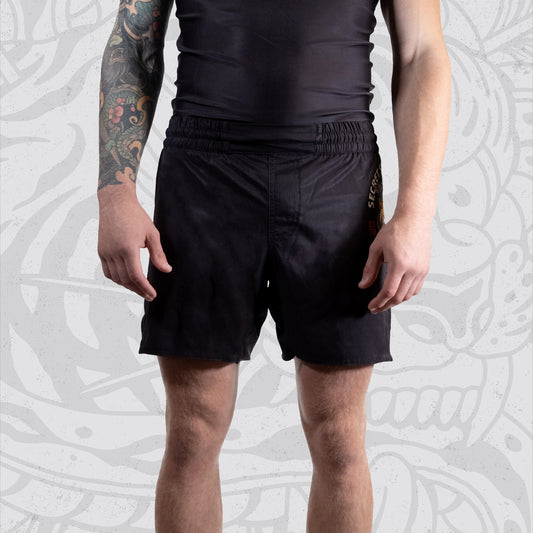10 Signs You Have a Great Grappling Coach
A great Jits coach is something all stranglers deserve..
and here we’re going to look more deeply at what makes someone a great coach..
Here are 10 signs you have a great BJJ coach.
1. They train (or have trained) extensively themselves.
This should go without saying, but as the number of BJJ gyms rises, the number of McDojos rises as well.
The number of unproven BJJ instructors has risen a lot over the last few years, with people promoting themselves, making up competitive accolades, and even going so far as to say that they got their black belt from “God”.
If your instructor has a legit black belt, you’re probably in good hands.
If they’re actively training themselves and trying to be the best grappler they can be, you’re in even better hands. At the very least, your coach should constantly be studying cutting-edge BJJ techniques.
2. They truly love Jiu-Jitsu.
When my coach Jeff got done with his first Jiu-Jitsu practice ever, his parents picked him up and he told them that he was going to do Jiu-Jitsu for the rest of his life.
He was 15 then, and he’s about 40 now. He still rarely misses a day on the mat.
There are few people that I know who rival Jeff’s passion for Jiu-Jitsu and martial arts. This is the kind of quality you want in an instructor.
The last thing you want is a teacher who doesn’t want to be there.
3. They are virtuous.
Call me old-fashioned, but I think that the guy who teaches you how to maim other people should have a moral compass.
I wouldn’t want to learn Jiu-Jitsu from someone who sees me as a cash cow and only wants me for my membership fee or my ability to win medals and promote his school.
Gym cultures are top-down. If your instructor has virtue, there’s a good chance the students he teaches will have virtue as well.
4. They are an effective communicator.
One reason I admire John Danaher as a teacher is that he’s a highly effective communicator of his techniques and training philosophies.
If you don’t agree with something Danaher is teaching, you better have a damn good reason why.
Jiu-Jitsu is a science in many ways – the science of manipulating your opponent using leverage, gravity, and tactics to make them submit.
Find an instructor who can communicate complex material to you simply.
5. They have a healthy relationship with their ego.
Have you ever seen your coach get tapped out?
If not, I’d think of this as a red flag. If your coach never gets tapped out and they aren’t one of the best competitive grapplers in the world, it’s either because they don’t spar due to injuries (which is one thing), or they are holding themselves back from the possibility of looking bad in front of their students.
My coach rolls with everyone. I would expect any coach who loves Jiu-Jitsu more than ego preservation to do the same.
6. They foster a welcoming environment.
Are visitors allowed at your gym?
If not, does the coach have a really good reason for this?
The only reason I could think of a gym not allowing visitors is that they have a big competition team and they’re trying to keep something hidden before a tournament.
However, even then, this seems sketchy.
A good coach will create a healthy environment. Plain and simple.
7. They love teaching (at least almost) as much as training.
Why did your Jiu-Jitsu coach open their school?
Was it because they have a passion for being on the mat teaching Jiu-Jitsu? Or is it because they didn’t want to have a “real job” and they wanted a place where they could train with their friends?
Are they a competitor who is teaching out of necessity, or is teaching something they’re actually passionate about?
This distinction is very important.
8. They’re a happy person off the mat.
One thing that tends to happen in the scenario listed in point #7 is that BJJ athletes will open Jiu-Jitsu school and then realise that they don’t like teaching Jiu-Jitsu very much.
They’ll find themselves owning a gym, expected to teach classes every day, and eventually, too old to compete well as an escape. They’ll realise that really, they don’t like Jiu-Jitsu very much at all.
It might sound ridiculous to you (how could someone who does Jiu-Jitsu all day ever be unhappy?), but I’ve seen it time and time again.
In time, they’ll become resentful. They’ll become angry.
They’ll become a terrible person to be around, and their gym will become a terrible place to be.
Happy coaches don’t have this problem.
9. They’re in good shape.
Jiu-Jitsu (especially when done competitively) beats the hell out of your body.
If you don’t prioritise recovery and stay healthy long-term, you’ll become unhealthy and unable to train with your students. This will negatively impact your ability to teach, and it will negatively impact your gym culture.
A good coach is in good enough shape to roll with his students – even if it’s just a few times a week.
A bad coach lets themselves go.
10. They support you – win or lose.
Your journey in Jiu-Jitsu is going to have a lot of ups and downs.
Injuries, belt promotions, wins, losses – all of it. You’re going to have days where everything goes great and days where you want to quit.
A great coach is there for you in your best moments and your worst moments. They’ll support you at the top of the podium and after you get submitted in 30 seconds in the first round. They’ll tie your black belt around your waist and they’ll tape every piece of athletic tape around your belt along the way there.
A great coach knows that the journey is deeper than medals, belts, wins, and losses. A great coach is there to support you through the lifelong journey of learning an incredible martial art.
I’m thankful that I have always had a coach like that.



